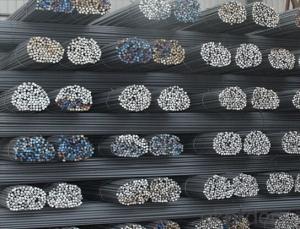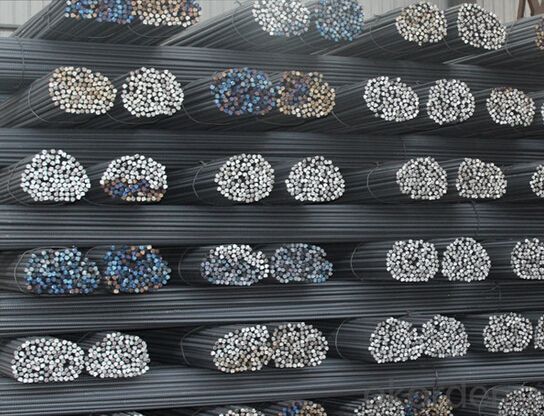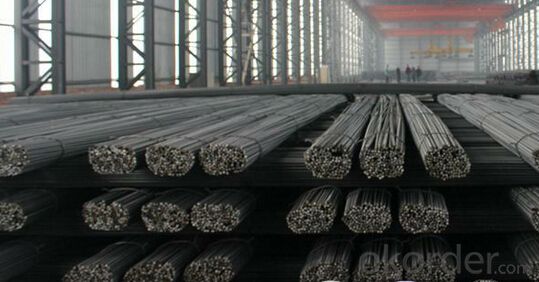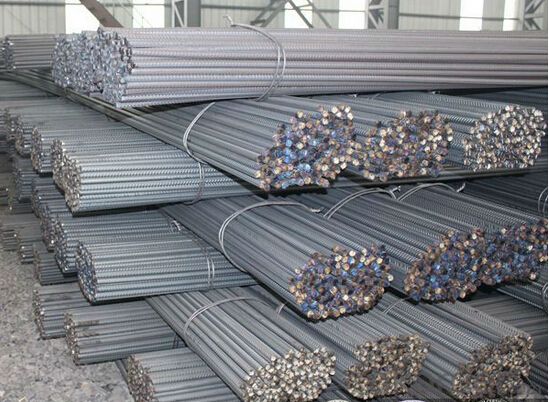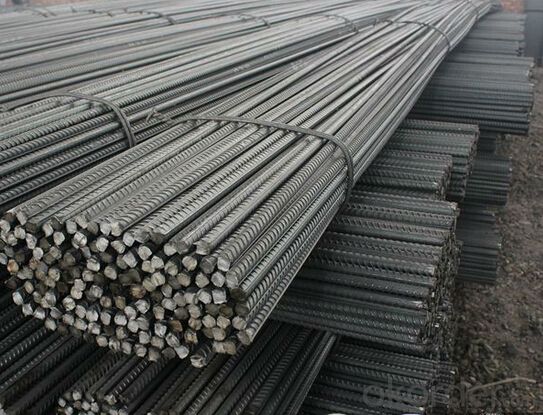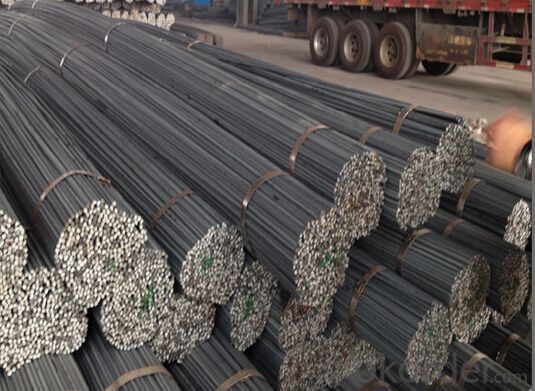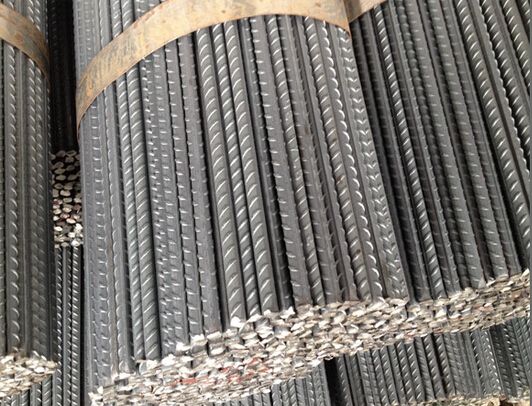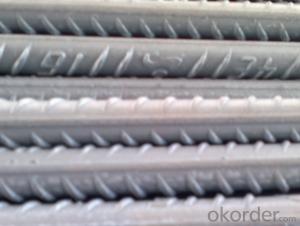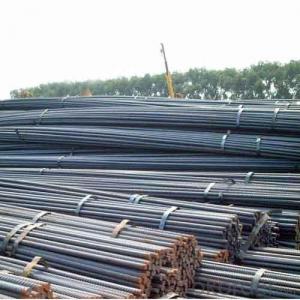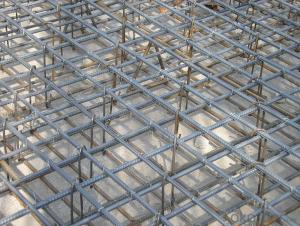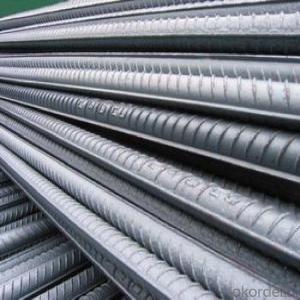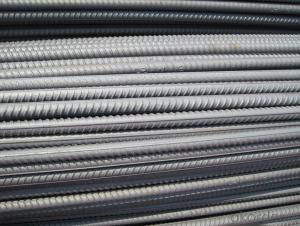Reinforcing Deformed Bar Grade BS4449:1997
- Loading Port:
- Tianjin
- Payment Terms:
- TT or LC
- Min Order Qty:
- 50 m.t.
- Supply Capability:
- 10000 m.t./month
OKorder Service Pledge
OKorder Financial Service
You Might Also Like
Specification
Reinforcing Deformed Bar Grade BS4449:1997
Details of Reinforcing Deformed Bar Grade BS4449:1997
Name | Deformed Bar |
Shape | Round Bar |
Standard | 1.GB1499.2-2007, HRB335, HRB400E 2. ASTM A615 Gr.40, Gr.60 3.BS4449/1997 |
Diameter | 6mm-50mm |
Length | 6m, 8m, 9m,12m as standard or as request |
Test | SGS/UT 100% Elements Testing |
Certificate: | ISO/Mill Certificate |
Service: | 24 hours online service / |
more than 20 years trading and manufacture | |
Quality Assurance: | the third party inspection, such as SGS, BV, TUV…etc. is acceptable |
Packaging Details: | Seaworthy Packaging or as per customer's packing instruction |
Specification of Reinforcing Deformed Bar Grade BS4449:1997
Standard | Grade | Yield Strength Mpa | Tensile Strength | Elongation% |
BS4449:1997 | 250 | 250 | 295 | 22 |
460A | 460 | 485 | 12 | |
460B | 460 | 500 | 15 | |
GB1499.2-2007 | HRB335/335E | 335 | 455 | 17 |
HRB400/400E | 400 | 540 | 17 | |
HRB500/500E | 500 | 630 | 16 | |
ASTM A615 & A615M-04a | GRADE40 | 280 | 420 | 12 |
GRADE60 | 420 | 620 | 9 | |
GRADE75 | 520 | 690 | 7 | |
JIS G3112-2004 | SD295A | ≥ 295 | 440-600 | 17 |
SD295B | 295-390 | ≥ 440 | 17 | |
SD345 | 345-440 | ≥490 | 19 | |
SD390 | 390-510 | 560 | 17 | |
SD490 | 490-625 | ≥ 620 | 13 |
Size | WEIGHT | WEIGHT | QUANTITY | ||
LENGTH 6M | LENGTH 12M | LENGTH 6M | LENGTH 12M | ||
6 | 0.222 | 1.332 | 2.664 | 751 | 375 |
8 | 0.395 | 2.37 | 4.74 | 422 | 211 |
10 | 0.617 | 3.702 | 7.404 | 270 | 135 |
12 | 0.888 | 5.328 | 10.656 | 188 | 94 |
14 | 1.21 | 7.26 | 14.52 | 138 | 69 |
16 | 1.58 | 9.48 | 18.96 | 106 | 53 |
18 | 2 | 12 | 24 | 83 | 42 |
20 | 2.47 | 14.82 | 29.64 | 67 | 34 |
22 | 2.98 | 17.88 | 35.76 | 56 | 28 |
25 | 3.85 | 23.1 | 46.2 | 43 | 22 |
28 | 4.83 | 28.98 | 57.96 | 35 | 17 |
32 | 6.31 | 37.86 | 75.72 | 26 | 13 |
36 | 7.99 | 47.94 | 95.88 | 21 | 10 |
40 | 9.87 | 59.22 | 118.44 | 17 | 8 |
50 | 15.42 | 92.52 | 185.04 | 11 | 5 |
CNBM Introduction of Reinforcing Deformed Bar Grade BS4449:1997 Supplier
CNBM International Corporation is the most import and export platform of CNBM group(China National Building Material Group Corporation) ,which is a state-owned enterprise, ranked in 270th of Fortune Global 500 in 2015.
With its advantages, CNBM International are mainly concentrate on Cement, Glass, Iron and Steel, Ceramics industries and devotes herself for supplying high quality series of refractories as well as technical consultancies and logistics solution.
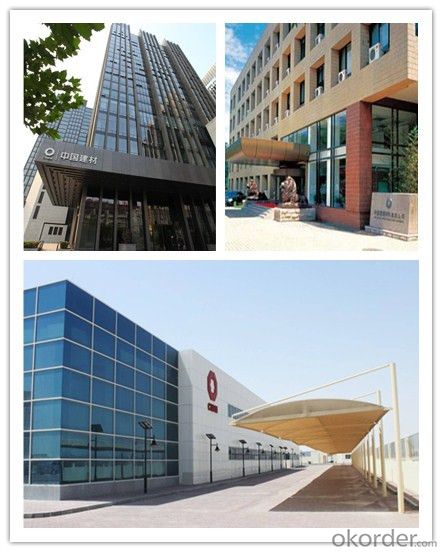
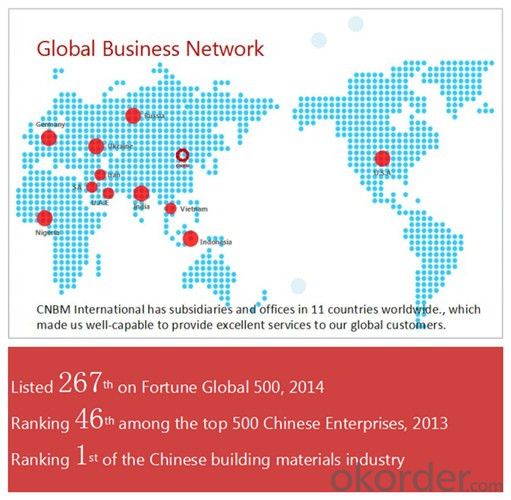
Packaging & Delivery of Reinforcing Deformed Bar Grade BS4449:1997
Packaging Detail | Sea worthy packing /as per customer's packing instruction |
Delivery Detail | 15 ~ 40 days after receiving the deposit |
Products Show
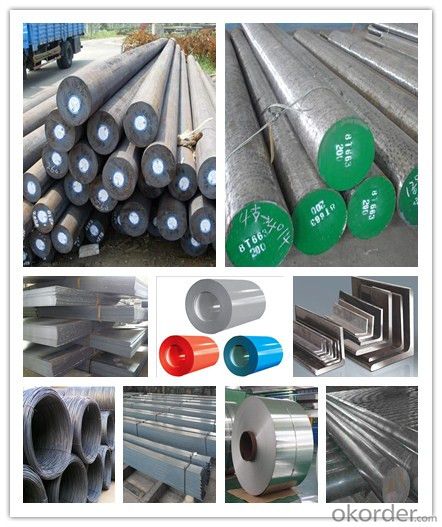
FAQ:
Are you a trading company or manufacturer? | Manufacturer |
What’s the MOQ? | 3 metric ton |
What’s your delivery time? | 15-35 days after downpayment received |
Do you Accept OEM service? | Yes |
what’s your delivery terms? | FOB/CFR/CIF |
What's the Payment Terms? | 30% as deposit,70% before shipment by T/T |
Western Union acceptable for small amount. | |
L/C acceptable for large amount. | |
Scrow ,Paybal,Alipay are also ok | |
Why choose us? | Chose happens because of quality, then price, We can give you both. Additionally, we can also offer professional products inquiry, products knowledge train (for agents), smooth goods delivery, excellent customer solution proposals. |
What's your available port of Shipment? | Main Port, China |
What’s your featured services? | Our service formula: good quality+ good price+ good service=customer's trust
|
Where are your Market? | Covering more than 160 countries in the world |
- Q: Can special steel be used in the medical device manufacturing industry?
- Yes, special steel can be used in the medical device manufacturing industry. Special steel alloys, such as stainless steel, are commonly used in the production of medical devices due to their excellent corrosion resistance, biocompatibility, and mechanical properties. These materials provide durability, sterilization compatibility, and are suitable for various medical applications, including implants, surgical instruments, and diagnostic equipment.
- Q: What are the requirements for special steel used in automotive parts manufacturing?
- The requirements for special steel used in automotive parts manufacturing are specific and crucial to ensure superior performance, safety, and durability of the vehicles. Here are some of the key requirements for special steel used in automotive parts manufacturing: 1. Strength and Hardness: Special steel used in automotive parts needs to have high strength and hardness to withstand the extreme stresses and loads that automotive components experience. This ensures the parts can endure heavy usage, resist deformation, and prevent failure under demanding conditions. 2. Ductility and Toughness: While being strong and hard, special steel must also possess good ductility and toughness. Ductility allows the steel to be formed and shaped into various intricate automotive parts, while toughness ensures that the parts can absorb energy and resist fracture or cracking upon impact. 3. Corrosion Resistance: Automotive parts are constantly exposed to various environmental conditions, including moisture, humidity, and road salts. Special steel used in automotive parts must exhibit excellent corrosion resistance to prevent rust and deterioration, thereby increasing the longevity and reliability of the parts. 4. Weldability: As automotive parts are often assembled through welding processes, it is essential for special steel to have good weldability. This allows for efficient and secure joining of different components, ensuring structural integrity and minimizing the risk of weld defects. 5. Heat Resistance: Special steel used in automotive parts manufacturing should have sufficient heat resistance to withstand high temperatures generated during engine operation, friction, or other thermal processes. This ensures that the steel maintains its mechanical properties even under extreme heat conditions, preventing premature failure or deformation. 6. Fatigue Strength: Automotive parts are subjected to repeated loading and unloading cycles, leading to fatigue failure if the steel does not have adequate fatigue strength. Special steel should possess high fatigue strength to withstand cyclic loading and resist fatigue cracks, enhancing the durability and reliability of the parts. 7. Dimensional Stability: Automotive parts need to maintain their shape and dimensions over time to ensure proper fit and functionality. Special steel used in manufacturing should exhibit dimensional stability, minimizing any warping or distortion during heat treatment or operational conditions. 8. Cost-effectiveness: While meeting the above requirements, special steel should also be cost-effective for automotive parts manufacturing. This means that the steel should be reasonably priced, readily available, and offer a good balance between cost and performance. Meeting these requirements is crucial for manufacturers to produce high-quality automotive parts that meet industry standards, perform optimally, and contribute to the overall safety and performance of vehicles.
- Q: How does special steel contribute to the aerospace fuel efficiency?
- Special steel contributes to aerospace fuel efficiency in several ways. Firstly, special steel alloys are used in the construction of aircraft engines, which helps reduce their weight while maintaining strength and durability. This reduction in weight results in lower fuel consumption as the engines require less energy to propel the aircraft. Additionally, special steel is also utilized in the manufacturing of lightweight airframe components, such as wings and landing gear, which further contributes to fuel efficiency by reducing the overall weight of the aircraft. Furthermore, special steel's corrosion resistance properties ensure the longevity of aerospace components, reducing the need for frequent replacements and maintenance, which in turn helps optimize fuel efficiency.
- Q: What are the main applications of special steel in the telecommunications sector?
- Special steel is widely used in the telecommunications sector for various applications. One of the main uses is in the manufacturing of transmission towers and antennas, where high strength and corrosion resistance properties are crucial for ensuring stability and durability. Special steel is also utilized in the production of cables and wires, providing excellent conductivity and resistance to wear and tear. Additionally, special steel is employed in the fabrication of satellite communication equipment, providing the necessary strength and resilience to withstand harsh environmental conditions. Overall, special steel plays a vital role in the telecommunications sector by enabling the construction of reliable and high-performance infrastructure.
- Q: What are the specific requirements for special steel used in the chemical industry?
- In order to ensure optimal performance and safety, special steel used in the chemical industry must satisfy specific criteria. Some of the essential requirements for special steel in this industry comprise: 1. Corrosion resistance: The steel must exhibit high resistance to corrosion as it will be exposed to various aggressive chemicals and corrosive environments. This necessitates the steel's ability to endure the corrosive effects of acids, alkalis, and other chemicals commonly used in the industry. 2. High temperature resistance: The steel should demonstrate excellent heat resistance to endure high operating temperatures frequently encountered in chemical processes. This is crucial to prevent degradation or loss of strength when subjected to elevated temperatures. 3. Mechanical strength: Special steel used in the chemical industry should possess superior mechanical strength to withstand the high stress and pressure that may arise during chemical processes. It should maintain its structural integrity even under challenging conditions. 4. Fatigue and stress resistance: The steel must exhibit good resistance to fatigue and stress as it will be subjected to cyclic loading and pressure variations during operation. This is vital to ensure the longevity and reliability of the steel in the chemical industry. 5. Pitting and crevice corrosion resistance: Special steel should be resistant to pitting and crevice corrosion, which can occur in areas exposed to stagnant or low-velocity corrosive media. Pitting and crevice corrosion can lead to localized damage and failure of the steel, making resistance to these types of corrosion indispensable. 6. Low impurity content: Special steel used in the chemical industry should contain minimal impurities to minimize the risk of contaminating the processed chemicals. Impurities can react with the chemicals or cause undesired reactions, potentially resulting in product quality issues or safety hazards. 7. Easy cleanability: The steel should possess a smooth surface and be easily cleanable to prevent the accumulation of contaminants or fouling. This is crucial to maintain the purity of the processed chemicals and ensure efficient equipment operation. By meeting these specific requirements, special steel used in the chemical industry can endure harsh conditions and corrosive environments while preserving its structural integrity, performance, and safety.
- Q: What are the main characteristics of magnetic steel forgings?
- The main characteristics of magnetic steel forgings are high strength, excellent wear resistance, and good magnetic properties. These forgings are known for their durability and ability to withstand extreme conditions. They also have good machinability and can be easily formed into various shapes.
- Q: What are the challenges in recycling special steel?
- Special steel recycling presents several obstacles due to its unique composition and properties. To begin with, special steel often contains various alloying elements, which enhance its strength, durability, and resistance to corrosion. These alloys can complicate and add complexity to the recycling process when compared to recycling ordinary steel. A key challenge is the separation of special steel from other metals during recycling. Special steel may contain valuable and rare elements like nickel, chromium, and molybdenum, which are crucial for its distinct properties. Extracting these elements from other metals demands advanced techniques and specialized equipment, thereby increasing the intricacy and cost of recycling. Another hurdle arises from the presence of impurities in special steel. These impurities can enter during manufacturing or through contamination during use. Eliminating these impurities is essential to ensure that the recycled steel meets the required specifications for its intended applications. However, the high melting point and purification resistance of some impurities can complicate the recycling process. Moreover, the physical characteristics of special steel, such as its high hardness and toughness, make it challenging to handle and process during recycling. Special steel often necessitates energy-intensive methods like shredding or higher temperature melting, which in turn increases the overall cost and environmental impact of recycling. Furthermore, the economic feasibility of recycling special steel can be a challenge. Market demand for special steel can fluctuate, making it difficult for recyclers to maintain a consistent and profitable supply. Additionally, the costs associated with collecting, transporting, sorting, and processing special steel can be higher compared to ordinary steel, further impacting the economic viability of recycling. In conclusion, the difficulties in recycling special steel primarily arise from its intricate composition, the need for separation from other metals, the presence of impurities, the physical characteristics of the material, and the economic feasibility of the recycling process. To address these challenges, innovative technologies, efficient separation methods, and a sustainable market demand for recycled special steel are necessary.
- Q: What are the requirements for special steel used in transportation infrastructure?
- Special steel used in transportation infrastructure must meet certain requirements to ensure its durability, strength, and resistance to various environmental factors. Some of the key requirements for special steel in transportation infrastructure include: 1. High Strength: Special steel used in transportation infrastructure must have high tensile strength to withstand heavy loads and stresses. It should be able to resist deformation and maintain its structural integrity under significant pressure. 2. Corrosion Resistance: Transportation infrastructure is often exposed to harsh weather conditions, including rain, humidity, and saltwater. Special steel must have excellent corrosion resistance to prevent rusting and deterioration over time. This is particularly important for bridges, tunnels, and railway tracks located near coastal areas. 3. Fatigue Resistance: Transportation infrastructure experiences repetitive and cyclic loading, which can lead to fatigue failure if the steel used is not resistant to this type of stress. Special steel should have good fatigue resistance properties to prevent cracking and failure due to repeated loading. 4. Weldability: Special steel used in transportation infrastructure should have good weldability to facilitate construction and repairs. It should be easily weldable without compromising its strength and performance. 5. Impact Resistance: Transportation infrastructure, such as guardrails and crash barriers, is subjected to impact loads from vehicles. Special steel should possess excellent impact resistance to absorb and distribute the energy from impacts, reducing the risk of catastrophic failure. 6. Fire Resistance: In the event of a fire, special steel used in transportation infrastructure should have a high melting point and retain its structural integrity for a reasonable amount of time. This is crucial for ensuring the safety of passengers and minimizing the damage caused by fire incidents. 7. Low Maintenance: For cost-effectiveness and long-term sustainability, special steel used in transportation infrastructure should require minimal maintenance. It should have a long service life and minimal need for repainting, repair, or replacement. Meeting these requirements ensures that the special steel used in transportation infrastructure can provide a safe, reliable, and durable foundation for roads, bridges, railway tracks, and other critical components of the transportation network.
- Q: What are the different methods of hardening special steel?
- There exist various techniques for strengthening special steel, each possessing its own merits and suitable applications. 1. Quenching: A widely employed approach for steel hardening, it entails heating the steel to a critical temperature and rapidly cooling it in a quenching medium such as oil, water, or air. This rapid cooling prompts the formation of a martensitic structure, rendering the steel harder but more brittle compared to its original state. 2. Tempering: Following quenching, steel is often subjected to tempering to decrease brittleness and enhance toughness. This process involves reheating the hardened steel to a specific temperature and maintaining it at that temperature for a predetermined duration. By doing so, internal stresses are reduced, and the overall mechanical properties of the steel are improved. 3. Case hardening: Employed to augment the hardness of the outer layer of steel while preserving a tough and ductile core, case hardening involves introducing carbon or nitrogen into the steel's surface through methods like carburizing or nitriding. This results in the creation of a hardened surface layer while retaining the desired properties within the core. 4. Induction hardening: Particularly useful for localized hardening of specific regions within a component, this technique employs an electromagnetic field to solely heat the desired area of the steel, followed by rapid quenching. Induction hardening allows precise control over the hardened region while maintaining desired properties in the remainder of the component. 5. Cryogenic treatment: Involving subjecting hardened steel to extremely low temperatures, often below -150°C (-238°F), this process further refines the steel's microstructure, enhancing its hardness, wear resistance, and dimensional stability. 6. Flame hardening: This method entails heating the steel's surface using a high-temperature flame and subsequently quenching it. Flame hardening is typically employed for large components or specific areas requiring localized hardening. Selecting the appropriate method is crucial and dependent on the steel's specific requirements and intended application. Factors such as desired hardness, toughness, wear resistance, and dimensional stability play a pivotal role in method selection.
- Q: Can special steel be used in the manufacturing of consumer goods?
- Yes, special steel can be used in the manufacturing of consumer goods. Special steel, with its superior strength, durability, and corrosion resistance properties, can be utilized in various consumer products such as kitchen appliances, cutlery, watches, automotive parts, and electronics. Its use enhances the performance and longevity of these goods, making them more reliable and efficient for consumers.
Send your message to us
Reinforcing Deformed Bar Grade BS4449:1997
- Loading Port:
- Tianjin
- Payment Terms:
- TT or LC
- Min Order Qty:
- 50 m.t.
- Supply Capability:
- 10000 m.t./month
OKorder Service Pledge
OKorder Financial Service
Similar products
Hot products
Hot Searches
Related keywords
